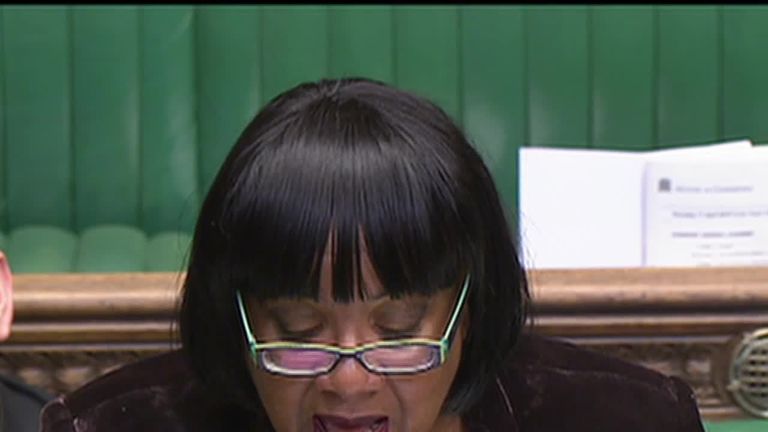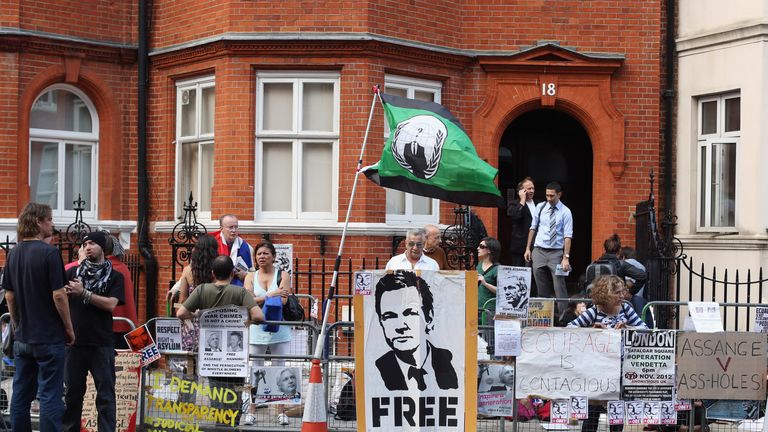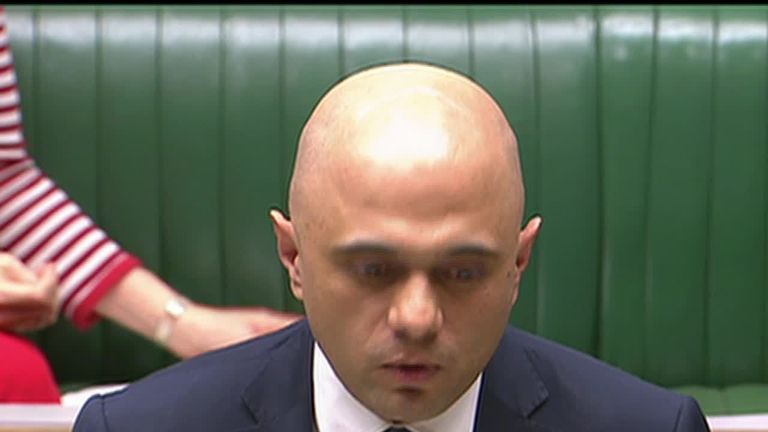Julian Assange: What happens next after embassy arrest

Saturday 13 April 2019 14:57, UK
After almost seven years holed up in the Ecuadorian embassy in London, WikiLeaks founder Julian Assange is facing potential extradition from the UK.
His looming crown court appearance for skipping bail is likely to be the least of his worries in the coming weeks, as he could end up facing far more serious allegations abroad.
Assange has been accused of rape in Sweden and conspiracy in the US. Washington is already seeking his extradition, and Swedish authorities might soon do the same.
So where will he end up - and when? Sky News looks ahead to what comes next in this long-running saga.
Where is he now?
Assange is being held at HMP Wandsworth in southwest London ahead of an appearance at Southwark Crown Court, where he will be sentenced for breaching his bail conditions.
The 47-year-old was sent to crown court after a judge at Westminster Magistrates' Court found him guilty of the charge, branding him a "narcissist" in the process.
He could be handed a 12-month jail term when he is sentenced.
Assange will return to Westminster via video-link on 2 May, in relation to his possible extradition to the US.
Why does the US want him?
It was widely assumed for years that US authorities had their eye on Assange, but it was not until his arrest in London that the department of justice finally confirmed why.
The official charge is of "conspiracy to commit computer intrusion", alleging that he conspired with former US intelligence analyst Chelsea Manning to access classified information on department of defence computers in 2010.
Among the data that ended up on WikiLeaks was footage of US soldiers killing civilians in Iraq.
The video, along with other information about US foreign policy, was released as part of what the department of justice described as "one of the largest compromises of classified information in the history of the US".
Manning was convicted of espionage and other offences in 2013, and sentenced to 35 years in jail. She was pardoned by former president Barack Obama and released in 2017.
However, Manning was jailed earlier this year for refusing to give evidence into a grand jury investigation into the website.
Assange could get five years behind bars if he is extradited and found guilty. The US may also add additional charges.
He has never been charged in relation to allegations of Russian interference in the 2016 presidential election, but his company was sued alongside Russia and the Trump campaign by the Democratic Party.
WikiLeaks published hacked emails from the Hillary Clinton campaign, which she has long pointed to as a pivotal moment in the run-up to the election.
What about Sweden?
Assange first claimed political asylum in the Ecuadorian embassy amid a legal battle against an attempt to extradite him to Sweden over an allegation of rape.
The Australian has always denied the claim and Swedish prosecutors set the inquiry aside in May 2017, saying they had exhausted all avenues of investigation as long as Assange remained in the embassy.
His arrest has since prompted the lawyer for the woman who accused him to ask for the case to be reopened.
Swedish prosecutors have confirmed that they are looking into the case.
It remains to be seen if they will before the opportunity to charge him expires next August, but dozens of UK MPs are among those keen for him to face up to the accusation.
Around 70 MPs have signed a letter to Home Secretary Sajid Javid urging the government to make sure that Assange faces Swedish authorities if the country requests his extradition.
Where will the UK choose to send him?
The future of Assange is ultimately in the hands of the British courts, but the home secretary can have a major say on where he could end up - and the issue is politically charged.
In addition to the letter signed by the MPs, there is also opposition to the prospect of him being extradited to the US, notably from Jeremy Corbyn.
Assuming Sweden joins the US in seeking his extradition, it is understood that Mr Javid could decide to prioritise one or the other.
The extradition act states that he should consider the relative seriousness of the offence, the place where it is alleged to have happened, the date a warrant was issued, and whether the person has already been convicted.
Rebecca Niblock, a lawyer who specialises in extradition at Kingsley Napley, told Sky News "the only two that are relevant to this case are the date and the relative seriousness".
She also said there "isn't a legal mechanism" through which Mr Javid could block an extradition request to Sweden, adding the UK has a "high degree of trust" in the legal systems of other EU member states.
Some are concerned that being extradited to the US first would mean Assange would not be returned to Sweden before the case there expires, making the role of Mr Javid more important than it might otherwise have been.
Were there just one potential request to consider, he would have little influence, as powers his office previously had to intervene have been severely limited since the case of computer hacker Gary McKinnon.
The then home secretary Theresa May was able to step in and stop his extradition to the US over fears that he was at risk of suicide, but a change in the law since then makes such interventions far more difficult.
Ms Niblock said Mr Javid would only be able to intervene if there were concerns that the death penalty could be used or if there were any "speciality arrangements", meaning that a person extradited to another country for one offence cannot have additional offences added on after they arrive.
How will Assange respond?
The tables may have turned against Assange, but his arrest does not make this saga any more straightforward.
With a top legal team and devoted supporters at his back, he will no doubt fight any attempt to extradite him.
He could appeal any decision to send him to the US or Sweden to the high court, and subsequently take the case to the Supreme Court and European Court of Human Rights.
Regardless of whether an appeal ended up being successful, it could significantly delay the process.
Assange will first have to serve his sentence for breaching his bail conditions in the UK, which means we could be deep into 2020 before we know for certain where he will be heading next - and how long he might have to stay there.











